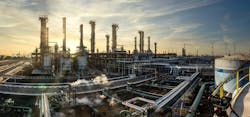ADNOC’s Ruwais refinery to produce sustainable aviation fuel
Abu Dhabi National Oil Co. (ADNOC) subsidiary ADNOC Refining has received ISCC System GmbH’s International Sustainability Carbon Certification (ISCC) to produce sustainable aviation fuel (SAF) at the operator’s more than 920,000-b/d Ruwais refining complex on the coast of the Arabian Gulf, about 245 km west of Abu Dhabi City, UAE.
Awarded on Oct. 3, the ISCC certification includes the ISCC European Union (EU) and ISCC Carbon Offsetting and Reduction Scheme for International Aviation (CORSIA) PLUS co-processing certifications, which allows the Ruwais refinery to produce SAF from a feedstock of used cooking oil that is blended with jet fuel, ADNOC said.
With the certification now in hand, ADNOC said it will now be able to supply its SAF from Ruwais to international airlines at Abu Dhabi Airport via the operator’s 1,600-km pipeline network.
Marking the first ISCC certification award to a refinery in the Middle East, the accreditation supports ADNOC’s commitment to collaborating with customers in accelerating their own decarbonization journeys, as well as forms an important step in furthering ADNOC’s internal sustainability journey under the UAE’s Net Zero by 2050 Strategic Initiative, which ADNOC has brought forward internally by 5 years to 2045, the company said.
In addition to becoming responsible for sourcing suitable biofeedstocks from the market into ADNOC Refining’s Ruwais operations, fellow subsidiary ADNOC Global Trading will be able to ramp up distribution activities to supply global and domestic customers with lower-carbon and more sustainable alternative fuels, products, and feedstocks, according to ADNOC.
“The development of [SAF] is a key part of our strategy to deliver lower carbon fuels to our customers,” said Sultan Al Bigishi, ADNOC Refining’s acting chief executive officer. “We are committed to supporting the aviation industry’s effort to ramp-up the use of [SAF] as one of the key pillars to decarbonize air travel.”
Without disclosing specific production or capacity details, ADNOC did confirm the Ruwais refinery’s first batch of SAF—which will be enough to fuel a return 787-10 Dreamliner flight from Abu Dhabi to Paris—would become available later in October.
According to manufacturer Boeing, the 787-10 Dreamliner can fly 336 passengers up to 11,730 km in a typical two-class configuration, with 25% less fuel and emissions than airplanes it was designed to replace.
The distance between Charles de Gaulle Airport and Abu Dhabi International Airport is roughly 5,250-2,260 km, with the 787-10 Dreamliner consuming about 2,570 gal/hr of conventional jet fuel, according to an average of unofficial online estimates from various aviation and travel association websites.
About the Author
Robert Brelsford
Downstream Editor
Robert Brelsford joined Oil & Gas Journal in October 2013 as downstream technology editor after 8 years as a crude oil price and news reporter on spot crude transactions at the US Gulf Coast, West Coast, Canadian, and Latin American markets. He holds a BA (2000) in English from Rice University and an MS (2003) in education and social policy from Northwestern University.

